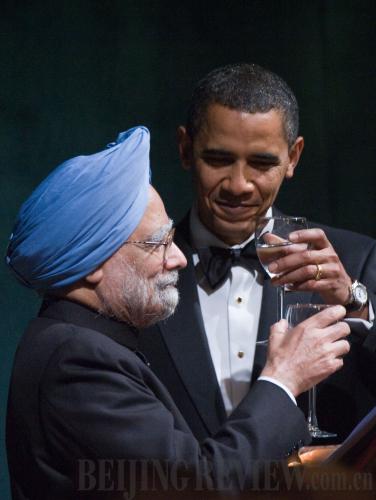|
 |
|
COURTESY OF THE HERITAGE FOUNDATION | U.S. President Barack Obama welcomed Indian Prime Minister Manmohan Singh on November 24 with an emphasis on the continuing value of a partnership carefully developed over the last two American administrations. President Obama referred to India as a "rising and responsible" power and encouraged India's role in helping to shape the political and security environment in Asia. Both leaders also emphasized their common commitment to democratic values such as individual freedom, rule of law and religious pluralism as a basis for stronger cooperation.
 |
|
CHEERS: U.S. President Barack Obama and Indian Prime Minister Manmohan Singh toast each other during a state dinner at the White House on November 24 (XINHUA/AFP) |
Moving forward, Washington and New Delhi should apply the principles behind those statements when implementing their foreign policies, especially in China, Pakistan, Afghanistan and Iran. President Obama was right to acknowledge India's central role in advancing freedom, peace, and prosperity in Asia. But the Obama administration should consult with India on a more consistent basis on the world's major challenges. For its part, India should place more emphasis on promoting democratic principles outside its borders, building on this internal strength as a way to increase its soft power projection.
Common goals
The contrasts between the U.S. relationship with China, as played out in President Obama's visit to Beijing on November 15-18, and that with India are already visible. While Obama's visit to Beijing fueled questions about American power and influence in the region, it has been just the opposite with Singh's visit to Washington.
The Indian prime minister has gone out of his way to show strong support for American power by praising the resilience of the American economy. In an interview with CNN, Singh declared that "as far as I can see right now, there is no substitute for the dollar," and he described the U.S. economic downturn as a "temporary setback."
These optimistic statements on the U.S. economy, combined with Singh's words of encouragement on U.S. engagement in Afghanistan, attest to the increasingly strong bonds and common purpose the two countries share both in the region and globally.
Hopefully President Obama took the opportunity in his private meeting with Singh to provide reassurances that the United States is attuned to Indian strategic concerns vis-à-vis China, particularly regarding ongoing border disputes and Chinese efforts to extend its influence into South Asia. Over the last three years, China has increasingly pressured India over disputed borders by questioning Indian sovereignty over the state of Arunachal Pradesh and by stepping up probing operations along different parts of their shared frontier.
Many Indians were irked by a reference in the U.S.-China joint statement released during Obama's visit to China on Washington and Beijing working together to "promote peace, stability and development in South Asia," viewing it as an example of the Obama administration's benign view of Chinese intentions in the region and willingness to discount Beijing's past unhelpful behavior.
A simple acknowledgement of Indian concerns on the China border issue would signal Washington is keeping tabs on these developments and would not stand by idly were Beijing to further seek to inflame border tensions.
| 